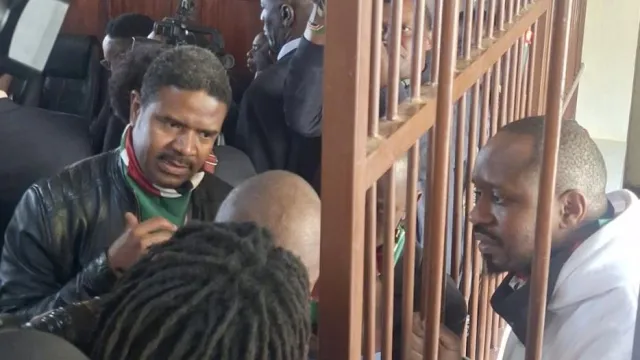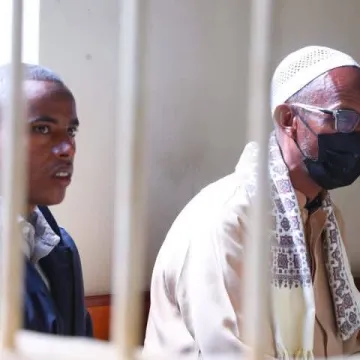Protesters as terrorists? Lawyers call out State for overreach

While the State had at the weekend indicated that it would sue activist Boniface Mwangi (right) with terrorism charge, the charge sheet produced in court on Monday stated less severe charge of "unlawful possession of firearms." Mwangi was, however, released on KES1 million bond by a Kahawa Court.
President William Ruto's government has been faulted for its penchant of preferring terrorism charges against individuals especially youth who have been vocal against his administration across the country.
According to lawyers, accusing protesters of terrorism is "legally baseless," ridiculous" and threatens to dent Kenya's image globally as a safe and competitive destination for investment.
In a post on X (formerly Twitter) senior counsel Donald Kipkorir, weighed in on the matter, stating "The ODPP should use TERRORISM Charges for real terrorists under International Law! To charge ordinary Kenyans demonstrating no matter the extent of violence with Terrorism is counterintuitive and will in the long run make Kenya look like it is overwhelmed by terrorists!"
Further, lawyer and Gatanga Constituency MP Edward Muriu noted that, "charging citizens under the anti-terrorism Act will send a damaging message with seismic consequences for our country’s economy and reputation. No investor will risk putting their money in a country branding its own citizens as terrorists.
He added, "Tourists will avoid Kenya, and the dream of solving Gen Z unemployment will remain just that, a dream."
Similar sentiments were shared by former Law Society of Kenya Chairman Eric Theuri, who termed the action by the Office of the Director of Public Prosecutions (ODPP) as selective application of the law.
"It is completely ridiculous. It has no legal basis... the period within which a terrorism suspect can be held in custody is about 60 or 90 days. It is a serious criminal offense. It involves a lot of organization, for people planning to cause death and destruction within a country," Theuri explained while appearing at Nation FM's morning show, Fixing the Nation.
Also faulting the decision to prosecute hundreds of protesters on terrorism charges was Siaya Governor and Senior Counsel James Orengo, who said the measure is "politically repressive."
"By stretch of any tortured legal definition and factual foundation, it's ridiculous to charge Boniface Mwangi and our children who have demonstrated a high level of political consciousness with terrorism. Protected speech and political action should never be criminalized," explained Orengo.
While the State had at the weekend indicated that it would sue activist Boniface Mwangi with terrorism charge, the charge sheet produced in court on Monday stated less severe charge of "unlawful possession of firearms." Mwangi was, however, released on KES1 million bond by a Kahawa Court.
"When we use our laws selectively in an attempt to deal with a manifestation of a social problem, we do not cure the problem. What we are actually doing is that we are creating an even bigger problem," added lawyer Theuri.
Since the protests of 25th June, and 7th July, this year hundreds of young protesters across the country have been arrested with the police preferring terrorism charges against them.
Last week, the ODPP sued Peter Kinyanjui alias Kawanjiru and Serah Wanjiku alias Thiga for the alleged arson of Kikuyu Law Courts.
"On the 25th day of June, 2025... you and others before court, committed a terrorist act which resulted to serious damage to government offices and buildings...property of the Kenyan Government," the charge sheet reads in part. Both are Kawanjiru and Thiga are aides to former Deputy President Rigathi Gachagua.
Stung by the criticism, on Monday evening, the ODPP said in a communique that the charges under the Prevention of Terrorism Act "should be understood within the framework of established legal thresholds and national security imperatives rather than interpreted as efforts to suppress legitimate political expression."
"Such actions qualify as acts of terrorism when intended to cause serious disruption of essential services... or create widespread fear through targeted destruction."





